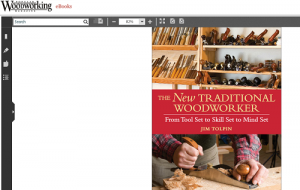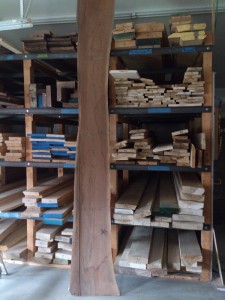We may receive a commission when you use our affiliate links. However, this does not impact our recommendations.
If you’re reading this, you may be part of the e-book era, or at least close to it.
I know a little about woodworking and a little about publishing. That’s more or less why I have a job here. What both of these endeavors have in common – besides owing their lives to trees – is that they are slowly but surely changing with the times. Both woodworking and publishing (or reading, which is the same thing at the end of the day) are undergoing massive and exciting changes. For the better, in my opinion. (That opinion, like all the opinions in this article, are mine alone – they may or may not be shared by other editors here at Popular Woodworking.)
Woodworkers today enjoy the benefits of blended shops that include precision machinery and precision hand tools. We enjoy access to some amazing instruction in both traditional designs and contemporary ideas. I expect that over the next decade, assuming our best woodworkers can continue to find good raw material, we’re going to see some major new pieces and methods emerging onto the scene.
How is that happening? In a word, innovation. Those who can think far enough ahead – visionary new toolmakers and woodworking leaders – are providing the means for the rest of the community to incrementally move forward.
It’s the same process in the world of publishing, reading and knowledge. Books were stuck. Like many of you, I enjoyed my reading anyway, but the methods were totally frozen in time. Then someone started the web, and what happened? The methods of information-gathering started to change. Because that’s why books existed in the first place – to gather information – they changed, too. We’re all part of that process of reinventing the book. Simply put, if you’re reading this blog post, you are contributing to this new era of on-screen reading and writing.
That does not, in any way, mean that we’re all going to give up our print books, the printed version of the magazine and our older ways of gathering knowledge. I’m not. I gotta have my paper every now and then, not to mention human contact. But it’s safe to say that we’re all in blended shops now – we can use any means we want to get what we want.
I invite you to tour the Popular Woodworking e-books web site. In my years in publishing, I have seen maybe one or two other e-book sites that are this clean and user-friendly. It’s a major triumph. Take a moment to watch the video from Tom Nunlist, our online community editor, that introduces everything the site has to offer.
Also, write to us about your blended shop (and your blended collection of reading material). We’d love to hear your thoughts. We think this stuff is pretty important!
Here are some supplies and tools we find essential in our everyday work around the shop. We may receive a commission from sales referred by our links; however, we have carefully selected these products for their usefulness and quality.












I really think Finewoodworking has the online subscription model set up perfectly. $35/year for all the new and old stuff: perfect. I like the inventiveness of the ebook subscription but I’d rather have the back issues for less money. Their iPad App is amazing as well. I like it better than reading a PDF in iBooks, which is what I have to to with my popwood digital subscription.
I believe in the editors of this magazine so I’ll try to help out where I can. I enourage you to keep trying.
-Shawn
Interesting thread. I’ve been buying woodworking books and magazines for 35-40 years. In the last several years I’ve been switching to digital subscriptions for all of my magazines after buying the compilations on cd. This has enabled me to clear hundreds of magazines from my shelves that even though categorized by year were impossible to easily find something I was looking for in a reasonable amount of time. Now with the digital library I’m able to find projects and tips at lightening speed using a few key word searches. It has also enabled me to donate my library of old mags to trade schools in my area giving another life to their usefulness for new woodworkers.
When it comes to books I love the ability to bring along quite a few books on my IPad. I have not gotten rid of my hard copy book collection but have purchased digital editions for ease in finding material in the books. I just recently purchased a digital book that I do not own a hard copy of. Will have to see how this works. At the age of 65 I’m still taking classes whenever I can and value those hard copies written by authors I was fortunate enough to take a class with and yes have them autograph those volumes. Hopefully some day my grandson will appreciate them as much as I have.
One rule I have with both magazines and books is that if I buy the digital version it must be in PDF format. No annual subscriptions for book libraries or proprietary magazine formats that tie you to a non standard format that could go with the magazine should it fail, never to be seen again. Why anyone would pay for something that they do not permanently own is beyond me. We work too hard for our money
I agree with a previous writer who says you can’t bring a computer into the shop knowing that the cooling systems will ensure their destruction by pulling dust into the unit. It doesn’t stop me however from printing a few key pages that I can make notes on and use on my clipboard as I build a project.
I just had the good fortune of traveling to Dublin Ireland again and visited Trinity College to view the book of Kells. This book was prepared by monks in the fourteen century. Their artistry is awe inspiring. It is so old and valuable that they display only one page a day in order to preserve it for as long as they can. I bring this up because prior to going I was able to get a digital copy of the entire Book of Kells on line. I brought it with me on my IPad. It gives anyone who gets it the ability to enjoy the artistry of the entire book. Ebooks of fourteenth century works, the monks could never imagine. If its good enough for these beautiful works of art I think the digital age will only enhance our woodworking experience.
I have a digital copy of the Book of Sloyd (my spelling is probably wrong because I didn’t go check it) a 19th century book of woodworking wisdom. Never have seen a hard copy but I’ll bet they are valued by their owners. I believe that ebook will be the way that woodworkers of the next century will be able to enjoy the works of Chris Schwartz, Doug Stowe and John Wilson, just to name a few of my favorite authors.
Guess I’ve gone on way too much just to get to the real point that change is inevitable. Embrace it. We will all learn a great deal from it.
Dan,
I have a Love/Hate relationship with this internet, ebook, Kindle, downloading stuff. On the one hand it is amazing that I can get almost any book published in the last three centuries at the stroke of a few keys. On the other hand I don’t particularly care for the impersonal, ethereal quality of the e world.
JoeA makes a good point: hard to judge value on an e-cover look alone, and well, not every writer is as well known and regarded as Mr Schwarz.
This brings to mind another thing. There is nothing new under the sun. Everyone on the PW staff has probably posted, written, or video presented, dovetails. I bet Roubo covered it as did Moxan. What you get when you buy a book is education, maybe some entertainment, and if you’re lucky both. I find that there’s something impersonal about the e-medium that diminishes the connection between writer and recipient. If you’re missing, even subconsciously that connection, then it loses its appeal. and don’t forget, you can’t take the laptop into the shop either! Dust gets all up inside of it and starts a fire.
Having said that I have several dozen books on my portable harddrive that travels with me from hotspot to hotspot. I could never carry that collection with me otherwise! Many of the books are old and unavailable. I’ve taken the time to reformat them so I can reprint them myself. I’ve been researching acid free paper, inks, and printers, and of course bookbinding. I should be able to create a series of custom made tomes for myself, sometime around 2045-50.
So, to bring this back around, unless it’s from a beloved writer, or your advertisement copy is so awesome that it beguiles me into purchasing an ebook, I like JoeA, have a hard time justifying its purchase.
But keep in mind that I’m older, and a kind of recalcitrant. anachronistic, Chris Schwarz style Aesthetic Anarchist.
Best regards, and stay safe!
Albert A Rasch FOB Shank, Afghanistan
(And YES, it does suck here.)
PS: I asked a question of Customer Service, and they answered right back! Bravo! AAR
I would be a lot happier if you were just doing regular ebook sales, so that I owned my copy of the book, rather than just a subscription to the book. Other companies are successfully distributing woodworking books in ebook formats, and companies like Steve Jackson Games and Paizo are selling PDF books. Paizo paid decent money for a watermarking solution. Steve Jackson Games is selling their books without watermarking, banking instead of people paying for the convenience of being able to re-download their books whenever they want.
Personally, I love the model that Steve Jackson Games is using. When a computer dies, or I purchase a new device, or I’m working somewhere away from my own computer, it’s very nice to be able to download a copy to the local device and have access to the materials. Is there piracy because of this policy? You bet. But it also builds good will with the people who are willing to part with the money, and I know of several people who have purchased legitimate copies of books that they had pirated, because the convenience is so hard to beat.
I’d rather spend the $150 on some wood.
meikou and therealbird,
Your feedback has been heard. We are always taking these comments and improving the site. Many thanks.
On specifics, we should have some more answers for you soon. (Look for something from me or from Nick Sanburg or Tom Nunlist.)
Here’s the pricing: http://ebooks.popularwoodworking.com/product/popular-woodworking-ebooks.
Dan
Might be nice if you told people the cost upfront rather than having to go through all the trouble of registering to then find out it’s more than expected?
So there’s an android app for that… why not one for shopclass.popwood?